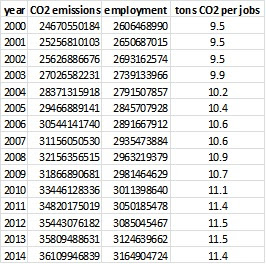The July-August issue of New Left Review published an essay by Robert Pollin titled "De-growth vs. Green New Deal" in which he outlines his objections to what Peter Dorman affectionately refers to as "a suicide cult masquerading as a political position." I have written a response to Pollin's article, that I have submitted to NLR, a draft of which, "Pollin's Green New Deal: Blueprint for Ecological Salvation?" may be downloaded as a pdf file from dropbox.In my response I am particularly interested in how Pollin's argument unwittingly recapitulates Robert Solow's from 46 years earlier, right down to the percentage of gross income to be invested in clean energy (Pollin) or pollution abatement (Solow). The ubiquitous "decoupling" turns out to be a euphemism for resource input productivity and
Topics:
Sandwichman considers the following as important:
This could be interesting, too:
Robert Vienneau writes Austrian Capital Theory And Triple-Switching In The Corn-Tractor Model
Mike Norman writes The Accursed Tariffs — NeilW
Mike Norman writes IRS has agreed to share migrants’ tax information with ICE
Mike Norman writes Trump’s “Liberation Day”: Another PR Gag, or Global Reorientation Turning Point? — Simplicius
In my response I am particularly interested in how Pollin's argument unwittingly recapitulates Robert Solow's from 46 years earlier, right down to the percentage of gross income to be invested in clean energy (Pollin) or pollution abatement (Solow). The ubiquitous "decoupling" turns out to be a euphemism for resource input productivity and not a particularly helpful one. Proponents often referring to the decoupling of GDP growth from "CO2 emissions" when what they mean -- unless they intend to deceive -- is the decoupling of the derivative rates of change.
A point I have mentioned previously is that Nicholas Georgescu-Roegen was not advocating "degrowth" as an ecological panacea. What he was saying (and what he wrote) was that evolution and history involve "permanent struggle in continuously novel forms" and is not a "predictable, controllable process." There is no "blueprint," no "built-in mechanism," no 20 or 30 year investment plan, (and no pure interpretation of the U.S. constitution or the Bible) that will relieve us of that permanent struggle.
 |
| Reverse 'Decoupling' in the 21st Century |
Pollin plays the "degrowthers don't have a programme and I do!" card with a vengeance. Of course the more detail and moving parts such a programme has, the better because the closer it resembles a machine or even a factory containing many machines. With that kind of challenge, it is very tempting to come up with a detailed programme to illustrate how various scenarios might work out in practice. But such competition will inevitably be judged on mechanistic grounds.
